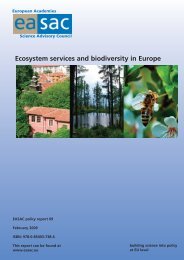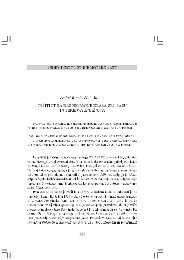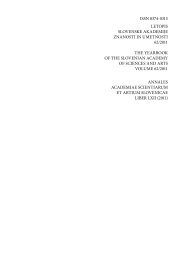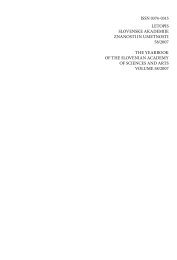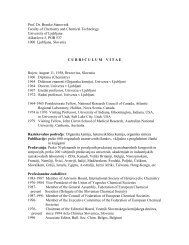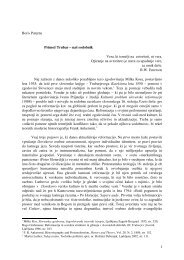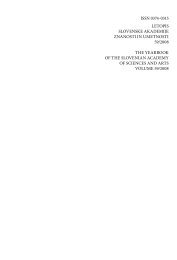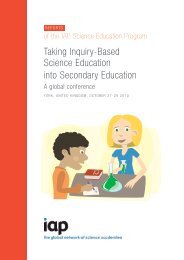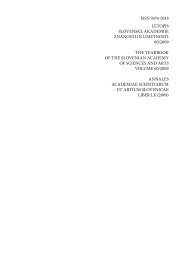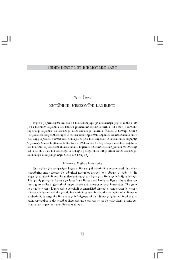- Page 1: ISSN 0374-0315 LETOPIS SLOVENSKE AK
- Page 4 and 5: SPREJETO NA SEJI PREDSEDSTVA SLOVEN
- Page 6 and 7: III. ČLANI / MEMBERS .............
- Page 9 and 10: SKUPŠČINA SAZU IZVRŠILNI ODBOR P
- Page 11 and 12: ORGANIZACIJA SAZU V LETU 2010 A) PR
- Page 13 and 14: 5. ODBOR ZA TRAJNOSTNI RAZVOJ Preds
- Page 15 and 16: KRONOLOŠKI PRIKAZ VODSTVA AKADEMIJ
- Page 17: II POROČILO O DELU SAZU REPORT ON
- Page 20 and 21: imeli, sijajne znanstvenike. Danes
- Page 22 and 23: naposled pa prirejamo javne razprav
- Page 24 and 25: delujoče akademije na svetu. Spoš
- Page 26 and 27: Gotovo so na višjem klinu človeko
- Page 28 and 29: adovednostjo čakamo, upam, da ne p
- Page 30 and 31: Discussion on Possible Conceptual a
- Page 32 and 33: for new appointments is always open
- Page 34 and 35: Canadian Slovenian Congress in Toro
- Page 38 and 39: At this point I wish to touch upon
- Page 40 and 41: DELO SKUPŠČINE SAZU Skupščina S
- Page 42 and 43: Naša osrednja dolžnost je enaka k
- Page 44 and 45: Doma je Akademija začela posvečat
- Page 46 and 47: K točki 5: Akad. Marijan Pavčnik
- Page 48 and 49: jeziku je to študij prve in druge
- Page 50 and 51: ob tej priložnosti na SAZU predava
- Page 52 and 53: grami ob sedanji ureditvi zavirajo
- Page 54 and 55: V. Razred za umetnosti V letu 2010
- Page 56 and 57: likor mi je znano, je imelo to spor
- Page 58 and 59: šča do problematike v zvezi z Zdr
- Page 60 and 61: Svet za varovanje okolja Svet za va
- Page 62 and 63: - trajni predstavitvi dragocene arh
- Page 64 and 65: Komisija za tisk in publikacije Kom
- Page 66 and 67: Po razpravi je komisija odločila,
- Page 68 and 69: Latvijska akademija znanosti, Riga,
- Page 70 and 71: znanstvenimi združenji. Glavni taj
- Page 72 and 73: MEDNARODNA IZMENJAVA RAZISKOVALCEV
- Page 74 and 75: Estonska akademija znanosti Dr. Jur
- Page 76 and 77: Matija Gogala je bil kot nekdanji
- Page 78 and 79: ZNANSTVENA SREČANJA / SCIENTIFIC M
- Page 80 and 81: Organizacijski odbor simpozija: pro
- Page 82 and 83: TISKOVNE KONFERENCE 13. maja Predst
- Page 84 and 85: Rezervat reke South Nahanni je teda
- Page 86 and 87:
- kakšne so bile posledice ilirizm
- Page 88 and 89:
Lojze Lebič : NAŠA GLASBENA SAMOP
- Page 90 and 91:
500-letnico rojstva, nihče ni izpo
- Page 92 and 93:
Slabost slovenske glasbe - naše sa
- Page 94 and 95:
Politika bi morala spoznati, da se
- Page 96 and 97:
Poročilo o obisku vodstva SAZU pri
- Page 99 and 100:
REDNI, IZREDNI IN DOPISNI ČLANI I.
- Page 101 and 102:
Službeni naslov: Fakulteta za dru
- Page 103 and 104:
Stefanović, Dimitrije , rojen 25.
- Page 105 and 106:
Zasebni naslov: 1000 Ljubljana, Jan
- Page 107 and 108:
III. RAZRED za matematične, fizika
- Page 109 and 110:
Zasebni naslov: 1231 Ljubljana Črn
- Page 111 and 112:
Zupančič, Črtomir , dr. fizikaln
- Page 113 and 114:
Službeni naslov: SAZU, 1000 Ljublj
- Page 115 and 116:
nologijo na Medicinski fakulteti Un
- Page 117 and 118:
predsedstva SAZU po 22. členu zako
- Page 119 and 120:
Zasebni naslov: 1000 Ljubljana, Met
- Page 121 and 122:
Zasebni naslov: 1000 Ljubljana, Jes
- Page 123 and 124:
Unger, Felix , rojen 2. marca 1946,
- Page 125 and 126:
Perdan J., Kamnik R., Čeru B., Baj
- Page 127 and 128:
Morozovska A. N., Eliseev E. A., Gl
- Page 129 and 130:
cristiane pubblicati a cura del Pon
- Page 131 and 132:
Gergesova M., Zupančič B., Saprun
- Page 133 and 134:
Fajfar P., Dolšek M.: A practice-o
- Page 135 and 136:
DRUGO Gabrovec S. (član uredništv
- Page 137 and 138:
Švegl F., Hevka P., Herga L., Grab
- Page 139 and 140:
NOVELE Jančar D.: The Prophecy (Pr
- Page 141 and 142:
ZAPISI Jemec A.: Ob razstavi Borisa
- Page 143 and 144:
DRUGO Kos J.: Slovenska duhovna kri
- Page 145 and 146:
zu Göttingen, N. F., Bd. 6). Berli
- Page 147 and 148:
Stanko Kristl IZVEDENA DELA Kristl
- Page 149 and 150:
Lebič L.: Intrada za deset trobilc
- Page 151 and 152:
Janez Levec Djinović P., Batista J
- Page 153 and 154:
program in zbornik povzetkov : sche
- Page 155 and 156:
Jaklič T.: Še nekaj mesecev potrp
- Page 157 and 158:
Orešnik J.: Transitivity in Natura
- Page 159 and 160:
Pahor B.: Po šipah ne moreš navkr
- Page 161 and 162:
Pavčnik M.: Constitutio (in)certa
- Page 163 and 164:
Pirjevec J.: Tito in Kardelj: od to
- Page 165 and 166:
Avouac J., Walker U., Tyndall A.,
- Page 167 and 168:
ents with chronic periodontitis. V:
- Page 169 and 170:
Svete J., Grošelj U., Baškovč J.
- Page 171 and 172:
DRUGO Stanovnik B.: New methodologi
- Page 173 and 174:
Alenka Šelih OBJAVLJENA DELA Šeli
- Page 175 and 176:
poziju Akkulturation im Mittelalter
- Page 177 and 178:
Tomaževič M., Gams M.: Seismic be
- Page 179 and 180:
60: 2009, str. 235-237, portret. St
- Page 181 and 182:
Biol Chem, 2010, vol. 285, no. 5, s
- Page 183 and 184:
February 24 th - 28 th , 2010. Prot
- Page 185 and 186:
PREVEDENE PESMI Zlobec C.: Dvojedin
- Page 187 and 188:
Parpura V., Baker B. J., Jeras M.,
- Page 189 and 190:
Benko A., Zorko Z.: Madžarizmi v M
- Page 191 and 192:
Žižek S.: A travers le réel. Par
- Page 193:
Znanstveni delavci SAZU Cvetko-Ore
- Page 197 and 198:
Andolšek-Jeras, Lidija, rojena 30.
- Page 199 and 200:
Brecelj, Bogdan, rojen 6. maja 1906
- Page 201 and 202:
Drujan, Boris, rojen 27. junija 192
- Page 203 and 204:
Gubenšek, Franc, rojen 31. oktobra
- Page 205 and 206:
višji znanstveni svetnik akademije
- Page 207 and 208:
Krklec, Gustav, rojen 23. junija 18
- Page 209 and 210:
Matjašič, Janez, rojen 14. maja 1
- Page 211 and 212:
Nejedly, Zdenek, rojen 10. februarj
- Page 213 and 214:
Prokop, Otto, rojen 29. septembra 1
- Page 215 and 216:
Stelè, France, rojen 21. februarja
- Page 217 and 218:
1939. Redni član od 7. oktobra 193
- Page 219 and 220:
UMRLI V 2010 DEPARTED IN 2010
- Page 221 and 222:
Njegova obširna bibliografija pove
- Page 223 and 224:
FRANC GUBENŠEK (1937-2010) 17. avg
- Page 225 and 226:
Za svoje delo je prejel več domač
- Page 227 and 228:
njena izdaja pa leta 1978 v Ljublja
- Page 229 and 230:
tovitev, ki je nastala na podlagi p
- Page 231 and 232:
vala tudi na posodobitev povojne sl
- Page 233:
so še: Američka uprava (1954), Ur
- Page 237 and 238:
BIBLIOTEKA V LETU 2010 V letu 2010
- Page 239 and 240:
knjig in letnikov revij 517.390 rok
- Page 241 and 242:
esedilih Letopisov, ki so ostale po
- Page 243 and 244:
za leto 2008), Letopis Slovenske ak
- Page 245 and 246:
PUBLIKACIJE SLOVENSKE AKADEMIJE ZNA
- Page 247 and 248:
12. Folia biologica et geologica 51
- Page 249:
25. Menart, Janez : Epigrami. (Kari
- Page 253 and 254:
SASA ORGANIZATION A) THE PRESIDENCY
- Page 255 and 256:
MEMBERS OF THE SLOVENIAN ACADEMY OF
- Page 257 and 258:
Office: Faculty of Law, Institute o
- Page 259 and 260:
Home: CRG-81000 Podgorica, Rista St
- Page 261 and 262:
Kos, Janko , Ph. D., born on March
- Page 263 and 264:
Ivić, Milka , born on December 11,
- Page 265 and 266:
Home: SI-1000 Ljubljana, Podrožni
- Page 267 and 268:
Tišler, Miha , D. Chem. Sc., D. h.
- Page 269 and 270:
Office: Kavli Institute for Cosmolo
- Page 271 and 272:
gby, Phone: +45 45/ 25 668, Fax: +4
- Page 273 and 274:
Centre, Ljubljana, retired. Associa
- Page 275 and 276:
SECTION FIVE Arts Full Members Bern
- Page 277 and 278:
Rebula, Alojz , born on July 21, 19
- Page 279 and 280:
Home: BA-71000 Sarajevo, Hazima Ša
- Page 281 and 282:
Unit at the Cedars-Sinai Medical Ce
- Page 283 and 284:
LIBRARY In the year 2010 the SASA L
- Page 285 and 286:
IMENSKO KAZALO ČLANOV SAZU / MEMBE
- Page 287 and 288:
H Hadži, Dušan 9, 108, 265 Hadži
- Page 289 and 290:
Micevski, Kiril 209 Michie, Donald
- Page 291 and 292:
Š Šalamun, Tomaž 9, 12, 119, 172
- Page 293:
ISSN 0374-0315 LETOPIS SLOVENSKE AK



